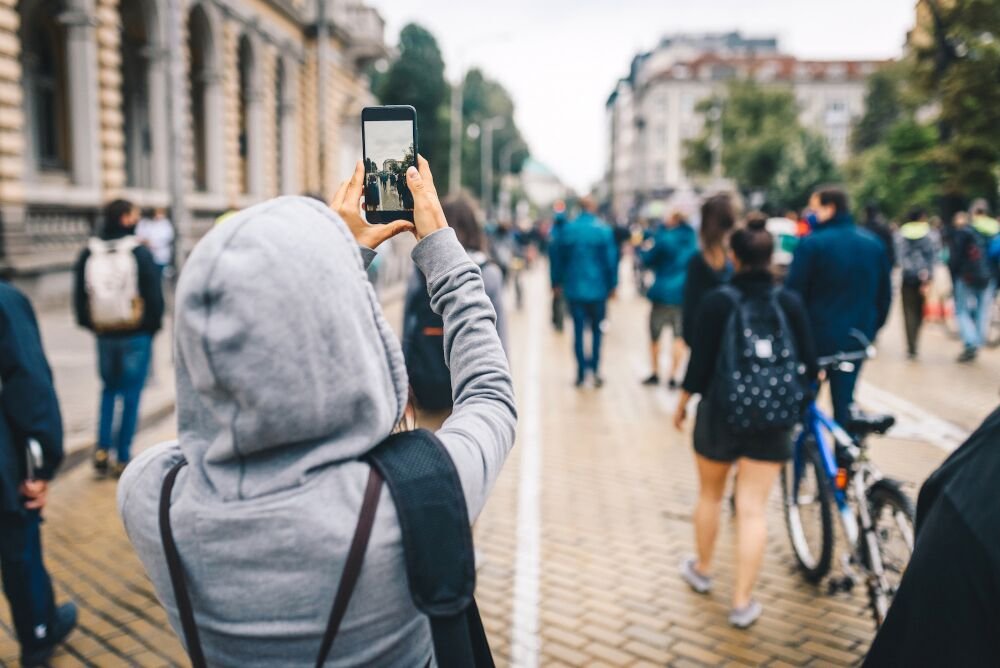Is recording someone without their consent illegal in Canada? The answer depends on the context — public or private spaces, harassment, or voyeurism laws.
Key Takeaways
-
Recording someone without consent is context-dependent
, with different rules for public and private spaces.
-
Recording in private spaces without consent can lead to charges like voyeurism
, which carries serious penalties.
-
Harassment or intimidation charges can apply
if persistent recording in public causes fear or compels unwanted actions.
In George Orwell’s dystopian novel “1984” video recording cameras are depicted as being just about everywhere. In plain sight and hidden in television sets, walls, clocks, trees and just about every public and private location where people may be, “Big Brother” constantly monitors the population’s activities. Today, millions of video cameras can record the daily activities of the Canadian population, but the federal and provincial governments are not doing the bulk of the recording. Instead, it’s the population at large and businesses that have a plethora of stand-alone, electronic-device-embedded, and hidden video-recording cameras at their immediate disposal.
This begs the question of whether video recording someone without their consent is legal in Canada. However, the answer is not straightforward as it depends upon the context in which a video recording is being made and whether the act breaches criminal or privacy laws. With working experience with these laws, the Greater Toronto Area
criminal defence lawyers
of Mass Tsang LLP can clarify this issue. So, turn your video camera off, and read on.
Public Versus Private Space Context
The first context to consider regarding the legality of video recording someone without their permission is whether the recording is conducted in a public or private space. Generally, people do not have a legal right to privacy in public areas, and no laws distinctly prohibit public video recording. That said, video recording someone in public may run afoul of other laws.
For example, if you were to persistently video record someone in public without their consent to the point that it makes them fear for their safety, the police could charge you with criminal harassment.
Section 264
of the Criminal Code defines harassing conduct as:
-
Repeatedly following someone from place to place.
-
Repeatedly communicating, either directly or indirectly, with someone.
-
Besetting or watching the home or location where someone resides, works, visits, or happens to be.
-
Engaging in threatening conduct directed at someone or their family.
The legal punishment for criminal harassment is up to two years imprisonment when charged as a summary conviction offence and a maximum of 10 years when charged as an indictable one. Thus, if you’re trying to make a funny video to share for likes on social media, you should probably stop filming and following someone who is getting noticeably upset by your amateur cinematography and asking you to stop.
Such activity could also run afoul of the Criminal Code
Section 423
intimidation law if the attempted video recording appears to compel someone to stop doing something they have the lawful right to do or start doing something they don’t want to do. Activities a video recording offender might do to rise to the level of criminal intimidation include:
-
Persistently following someone.
-
Accompanies by others, persistently following someone in a disorderly manner on a highway.
-
Blocking or obstructing a highway.
-
Besetting or watching the place a person resides, works, or happens to be.
Criminal intimidation is an indictable offence that carries a maximum sentence of five years imprisonment.
In non-public spaces, video recording someone without permission may not be illegal on its own, but other activities could be. For example, you cannot just enter someone’s private home or property uninvited and start filming. If nothing else, this could lead to provincial
trespassing charges
or, if you do it at night, Criminal Code
Section 177
“trespassing at night” charges. Even if invited into the home or onto the property, a person has no legal right to video record without the owner’s consent. Under Ontario’s privacy laws, a property owner can sue someone who films without consent.
For the purposes of the law, non-public spaces include anywhere where a person should have a “reasonable expectation of privacy.” Video recording without consent in such places can run afoul of the law, especially if done surreptitiously and for a sexual purpose. In such incidents, police can charge offenders with
voyeurism
.
Is video recording without consent illegal in Canada?
Yes, it can be illegal. In public, persistent recording may lead to harassment charges, while in private, recording without consent can result in serious charges like voyeurism, carrying penalties of up to 5 years imprisonment.
You Do Not Want to Be Charged with Voyeurism
Canada’s Criminal Code delineates voyeurism under
Section 162 (1)
of the Criminal Code defines voyeurism as “Every one commits an offence who, surreptitiously, observes — including by mechanical or electronic means — or makes a visual recording of a person who is in circumstances that give rise to a reasonable expectation of privacy, if:
“(a) the person is in a place in which a person can reasonably be expected to be nude, to expose his or her genital organs or anal region or her breasts, or to be engaged in explicit sexual activity;
“(b) the person is nude, is exposing his or her genital organs or anal region or her breasts, or is engaged in explicit sexual activity, and the observation or recording is done for the purpose of observing or recording a person in such a state or engaged in such an activity; or
“(c) the observation or recording is done for a sexual purpose.”
This seems clear-cut: surreptitiously video recording anybody in a private place who’s engaged in explicit sexual activity or exposing private parts is obviously voyeurism. However, what if the charges are based on element (c)?
Well, if your surreptitious video recording efforts seem to focus on a person’s private parts, even if clothed, the filming could lead to voyeurism charges, provided the person had a reasonable expectation of privacy. While you may not think this privacy expectation covers public spaces like beaches and streets, Canada’s Supreme Court ruled differently in 2019. In its precedent-setting
R. v. Jarvis 2019 SCC 10
ruling, the court determined that “the word ‘privacy’ includes the concept of freedom from unwanted scrutiny, intrusion, or attention.”
This ruling resulted in a voyeurism conviction for a teacher who had secretly filmed his clothed female students in class with a camera hidden in his pen. Because the recordings tended to focus on the students’ breasts, the filming was deemed to have been done for a sexual purpose. And the expanded definition of what constitutes privacy ensured his conviction. Thus, if you were to surreptitiously video record a woman on a beach with a focus on her bikini areas, it could constitute criminal voyeurism under the law.
You do not want to be charged with voyeurism, as a conviction carries a maximum penalty of a $5,000 fine, two years imprisonment, or both when prosecuted as a summary conviction offence. When charged as an indictable offence, the maximum sentence is five years. If convicted, you also face mandatory inclusion on the
Ontario Sex Offender Registry
and/or
federal sex offender registry.
Turn to Mass Tsang for Expert Criminal Defence
If you’re video recording activities get you into trouble with the law, you should seek out the services of a skilled criminal defence lawyer to ensure a positive outcome, and if charged with voyeurism, hire an experienced
sexual assault criminal defence lawyer
. With a stellar 30-plus year record of helping Greater Toronto Area clients favourably resolve their criminal charges, turn to Mass Tsang for your criminal defence, and
contact us
today for a free consultation.






